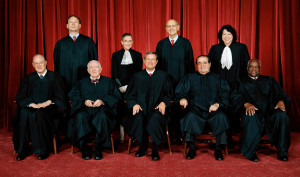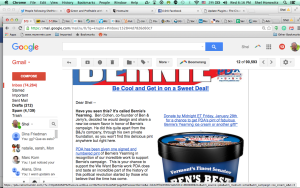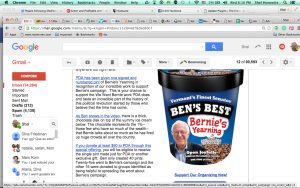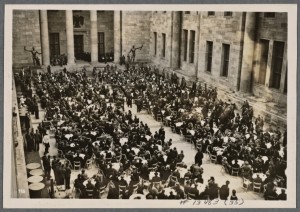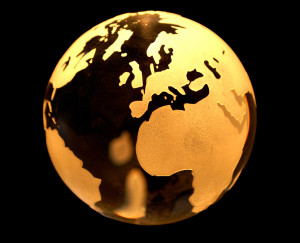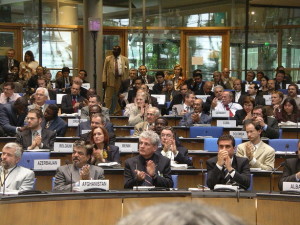Why Bernie Isn’t George McGovern—Or Michael Dukakis
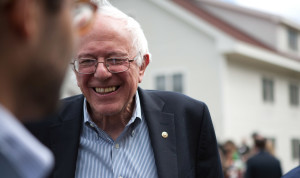
A friend and I were discussing the presidential election, and he brought up the tired old shibboleth that the Democrats got so badly burned on George McGovern’s 1972 campaign that they don’t feel any progressive candidate is electable.
I will concede some surface similarities: both are/were genuine progressives who can ignite the youth vote, neither had the support of the party elite, both were critical of the war machine.
But if anything, I’d say McGovern is more accurately compared to the failed campaigns of Michael Dukakis, Al Gore, and John Kerry—and even John McCain.
- All three of the later Democratic candidates were ashamed to be tagged as liberal, probably because they were afraid of a McGovern-style backlash.
- All four of the Democrats were inept campaigners (I actually attended a Mc Govern rally in 1972; he was a terrible speaker).
- Both McGovern and McCain massively undermined public confidence in their candidacies by picking poorly vetted vice presidential running mates and then behaving scarily once it was obvious they had picked badly. When a history of mental illness emerged, McGovern threw Thomas Eagleton under the bus just days after saying he was “1,000 percent for Tom Eagleton.” McCain stuck with Sarah Palin as her competence issues became increasingly obvious. Neither man’s candidacy was helped by the way they handled it.
- Gore almost certainly would have won Florida if the election had been honest; it wasn’t about the 537-vote margin of victory in the final count, but the number of likely-Democratic votes that were either prevented from being cast or discounted as “spoiled.” Statistician Greg Palast found that of the 97,000 spoiled ballots from primarily African-American precincts, 77,000 would have likely been for Gore. Earlier, Palast identified a “scrub list” of 173,000 voters removed from the Florida rolls in advance of the 2000 election, the vast majority of whom were likely Democrats.
- Kerry’s 2004 loss in Ohio (which cost him the presidency) was under a similar cloud; a search for “kerry bush ohio fraud 2004” brings up 177,000 hits in Google, including this very detailed article in Harper’s that accuses the Republicans of numerous dirty tricks.
- Both Gore and Kerry conceded before the controversy was settled; Kerry actually conceded the morning after the election. McGovern’s loss was indisputable, as was McCain’s; conceding was not an issue.
Now—why is Bernie’s campaign different?
- Unlike the Dukakis disaster, the Republicans can’t make “liberal” sound like a curse word. Bernie is more than liberal. He’s progressive. He is an open socialist, so calling him a socialist has no traction; we all know that already, and it doesn’t seem to be hurting his performance.
- He has a track record of coalition building and getting things done both as an executive (as Mayor of Vermont’s largest city, where he served multiple terms and continues to be enormously popular) and as a legislator.
- His fundraising prowess is astounding, and has been outside the mainstream Democratic party channels. It’s new money coming into the party. While Trump can claim he’s not beholden because he’s funding his own campaign, he is closely allied with his fellow billionaires. Bernie is a candidate of the people and supported financially by the people.
- Bernie has enormous integrity—and that makes him unique in the current crop of candidates. Clinton, Trump, Cruz, and Rubio have all been accused of various shady dealings (as was Gore).
- Bernie’s strength on the left and Trump’s on the right shows clearly that the old style of politics-as-usual is out of favor. About the only thing they have in common (other than their NYC roots) is that their campaigns have been fueled by enormous voter disaffection with politics-as-usual.
- He uses social media better than anyone else in the race—and this is one of several reasons he polls so well with Millennials.
- Unlike McGovern, Dukakis, Kerry, or McCain, Sanders is a skilled orator who really knows how to work a crowd.
- He polls better than Clinton in match-ups against all the Republican candidates.
- Ambitious agendas are always more popular than treading water. Clinton urges us to tread water—to protect Obamacare, to accept the economic crumbs falling off the silk tablecloths of the 1%—to keep things as they are. Bernie urges us to think big. It’s the same message of hope and change that inspired millions of first-time voters to come out for Obama. But Obama was a centrist running as if he were a progressive, and he let a lot of those people down. Sanders has been putting his beliefs into action for decades. And he can show consistency over time, unlike the flip-flopping Clinton and Trump.
- His positions would actually help the majority of voters if they became policy.
- He’s attacking an enemy that is disliked (Wall Street). And he’s reaching out to all the constituencies Trump (and to a lesser extent the other GOP candidates) has attacked.

